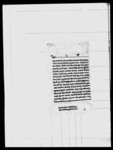An arjī from Lokaramaṇa Upādhyāya re the reception of diplomatic documents and military events in Afghanistan (VS 1897)
ID: DNA_0004_0031
Edited and
translated by Manik Bajracharya, Simon Cubelic, Rajan Khatiwoda
in collaboration with
Yogesh Budhathoki
Created: 2016-07-20;
Last modified: 2018-06-25
For the metadata of the document, click here
The accompanying edition, translation/synopsis and/or commentary are available under the terms of the Creative Commons Attribution-ShareAlike 4.0 International License
Abstract
In this letter Lokaramaṇa Upadhyāya confirms the reception of diplomatic documents and reports on his meeting with Henry Torrens and recent developments in the Anglo-Afghan War.Diplomatic edition
[1r]
1⟪नं३७०⟫1अर्जि¯¯ ¯¯ ¯¯ ¯¯ ¯¯ ¯¯ ¯¯ ¯¯ ¯¯ ¯¯ ¯¯ ¯¯ ¯¯ ¯¯ ¯ ¯¯2उप्रान्तआश्वीनवदि१४रोज५कामितिमा वक्सिपठाय़ागय़ाकोलालमोहर
3रजिडन्टसाहवलाइसौपिय़ाकाय़ातदास्तकानकल२लाठसाहववाटग
4य़ाकाषरिताकातर्जुमाकोनकल्समेतआश्वीनषुदि८रोज१कादिन
5डाकमार्फतपाइसीरचह्राञाञाहावातचितकोप्रसंगचल्दाहुकुम्भय़ा
6वमोजिमकोआसएलिजवावदिन्यापाठगरूलाआजकालदसैआउना
7लेकौसलदफदर्षानावन्दछषुल्यापछिरजिडन्टवाटआय़ाकाकागजप
8त्रकोहव़ालवुझिपाय़ाकाषैषवरसमेतविन्तिचह्राइपठाउलाएहिसुदि७
9रोज६कादिनटारन्साहवएकटंसिकृटरिकाहादफ्दरषानाकोमामु
10लिदर्वारहुदादर्वारकोषैरवाफिय़तसोध्यासवतर्हसितषैरवाफियत्छ
11भनिजवावदिञामेडाकसाहवदफदरषानाकासिकृटरिवेरामभैहावाषा
12नभनिगयाकाथियाआजकाल्माआउछन्भन्न्याषवर्छकन्दहार्कादषिन
13वलुचिस्तानकामुलुकमाकलात्कोकिल्लाकन्दहारकावुलअमलभयापछि
14अंगरेजहरुलेअमलगर्याकोथियोअंग्रेजहरुसितलडिफेरिउहाकापैठा
15नहरूलेअमलगर्याभन्न्याषवरअषवार्काकागजमादेषिहजुर्माविन्तिच
16ह्राइपठायाकोछईतिसम्वत्१८९७सालमितिआश्वीनशुदि१०रोज३
17मोकाम्कल्कत्ताचित्पुरशुभम्¯¯ ¯¯ ¯¯ ¯¯ ¯¯ ¯¯ ¯¯ ¯¯ ¯¯
18सेवकलोकरमणोपाध्यायकोवेदोक्त:पु
19राणोक्त:कोटिकोटिसुभासीर्वादशुभम्
Translation
[1r]
Number 3701
Arjī ---
Uprānta: Having received on Sunday, the 8th of the bright fortnight of Āśvina, through post, the lālamohara, two copies of the memorandum handed over to the Resident sāhaba2 , and the copy of the translation of the kharitā dispatched by Lord (lāṭha) sāhaba3 , all sent by Your Excellency on Thursday, the 14th of the dark fortnight of Āśvina, I bowed my head [to you].4 Here, whenever an occasion for conversation comes up, I will remember to reply with the aim enjoined by Your Excellency. These days, now that Dasaĩ has arrived, the Council and the Record Office (Daphtarakhānā)5 are closed. Once they are [back] open, I will inform you about the news that I receive after I have understood the turn of events [described] in the documents that have arrived from the Resident. During a regular court assembly of the Daphtarakhānā at [the office of] Acting (ekaṭaṃ) Secretary Torrens6 sāhaba this [past] Friday, the 7th of the bright fortnight, I was asked about the well-being of the palace. I replied: "Things are well in every respect."
Maddock7 sāhaba, the secretary of the Daphtarakhānā, fell sick and has left for a cure (hāvā khāna, lit. to get [fresh] air). There is news that he will return any day now.
In the territory of Baluchistan, south of Kandahar, the British, having previously seized Kandahar and Kabul conquered the fort of Kalat.8 I have seen news in the newspapers that the Pathans there have re-occupied it after fighting with the British and have [herewith] informed Your Excellency.9
Tuesday, the 10th of the bright fortnight of Āśvina in the [Vikrama] era year 1897 (1840 CE). Residence: Chitpur, Calcutta. Auspiciousness.
Crores and crores of auspicious blessings from [Your] servant Lokaramaṇa Upādhyāya as uttered in the Vedas and Purāṇas. Auspiciousness.
Commentary
This report refers to two political events of the year 1840. The first one pertains most probably to the Anglo-Nepalese relations of which Stiller 1981: 5ff. gives an account and regarding which he presents the major historical sources. The following summary is based on that account. On 21 June 1840 Nepalese troops stationed at Someshwar infiltrated the Ramnagar area of Northern Bihar, in the course of which they harmed British subjects. With this move the Nepalese government was trying to press its claim to that land after the demise of the heirless ruler of Ramnagar, on the basis that it had been given to a Gorkhali princess as dowry. However, the British regarded themselves as the rightful claimants since the land was within their territory. The British demanded not only a complete withdrawal of the Nepalese troops but also an official renouncement of all claims to that territory, punishment of the infiltrating soldiers and 5,000 rupees compensation. Eventually King Rājendra submitted to the demands of the Company government. The second part of the document reports on events of the First Anglo-Afghan War (1839–1842), which weakened the British military position and was therefore of interest for the Nepalese government.

